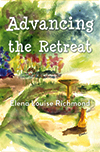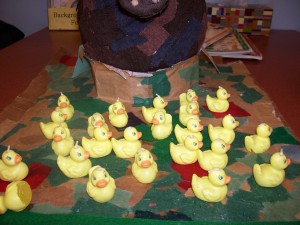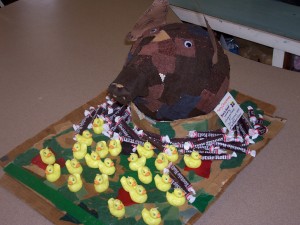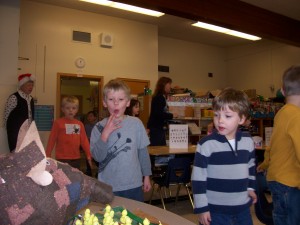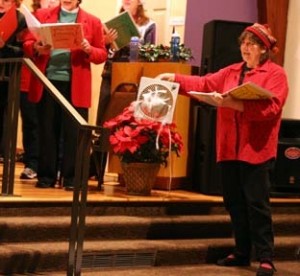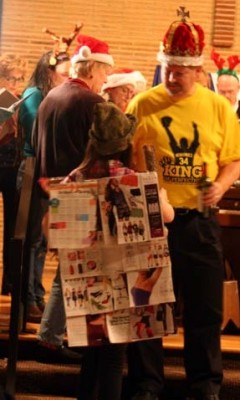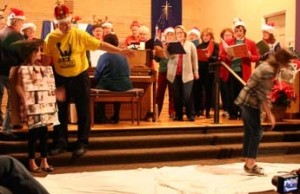The Boar’s Head: Still Bearing Gifts
Anyone remember my Boar’s Head? The short version is that two years ago The OK Chorale sang “The Boar’s Head Carol” and the kindergarten class of Gail, alto, made a Boar’s Head of paper maché and fabric to use in a processional. We processed our Boar’s Head laden with cookies instead of “bedecked with bay and rosemary” like they do at Christ Church, Oxford. Here’s the full story: A Boar’s Head in the Hand.
The week before Christmas, two years ago, I made a pilgrimage with the Boar’s Head to the place of its birth: Gail’s classroom. She and I paraded it around the room, singing the carol, letting the children each take a fortune-teller fish of which I had 50 or so from Archee McPhees. I use them for prizes in my music studio. Except my students have all gotten so many of them they don’t have much currency any more.
Then I packed the head as carefully as the most fragile Christmas ornament. For the past two Christmases, the Official OK Chorale Boar’s Head has sat in my holiday window and joined The Chorale for cookies after our concerts.
This year I arranged with Gail to make another pilgrimage. Again I wanted an offering for each child. Otherwise I think it would be quite strange to parade a paper maché pig’s head around a kindergarten classroom and ask them if they had ever heard of England.
I also wanted to avoid going into a store. Ideally I stay out of stores from Thanksgiving until New Years except to buy food and Valium. I had a bunch of little yellow ducky candles that I bought at a yard sale a few years ago and have been doling out for various occasions ever since. It was the only thing in my house besides the fortune teller fish that I had in bulk. I counted them quickly. Twenty.
“Gail, how many kids in your class?”
“Twenty Four”
“Damn.”
I remembered that I had given a handful of the candles to my painting buddy Susan.
“Susan, do you have any of those candles left?”
She rummaged in a drawer. “I have three.”
“Damn.”
I took Susan’s remaining ducks. Surely there would be children absent from Gail’s class on the last afternoon before winter break.
The last day before winter break arrived. Gail and I e-mailed that morning.
“What’s your head count today?”
“All twenty-four are present.”
Oh great. Twenty three little duckys, and twenty-four kindergarteners. If you think I could have gone to the Dollar Store and bought 24 trashy Christmas tchotchkes, you are right, but you are not fully appreciating the drama of my internal world by the weekend before Christmas. I was bordering the State of Frenzy due to my inability to say No to anything the season had thus far asked of me. I had become heartily sick of Christmas by umm, about Dec 16 but I was wound up and couldn’t stop. Couldn’t stop baking, couldn’t stop wrapping, couldn’t stop writing cards, couldn’t stop combing my files for people I have never sent a Christmas card to in my life, couldn’t stop being cheerful to students and choirs, or having holiday teas with my friends who I see every week year round, could stop doing what I set out to do with a focus as narrow as a toilet paper tube.
I feverishly counted my 20 duckys again—this is something we do at Frenzy State: the same thing over and over. But lo, there were actually 21 duckies. I must have originally counted them like I sometimes “balance” my checkbook. There were sort of 20ish duckys the first time I counted. Or it might have been a Christmas miracle.
Getting the Boar’s Head and the duckys ready I remembered that I had a tin of tootsie rolls, the remnant of an earlier party. The hostess had begged me to take them off her hands and I figured I could unload them on my students or the neighbors or some holiday function where I know there’s going to be too much of everything but still hate to go empty-handed. God knows I didn’t want them. I grabbed the tin and was out the door. At the North Beach Elementary School office where I was outfitted with a visitor’s badge, I dumped out the duckies and the tootsie rolls to the delight of the two children being timed out in the office. Gail came into the office looking frayed and ready for her vacation to start.
“I don’t know what we’re going to sing,” she said. “And I forgot my music.”
I wanted to suggest we pelt the duckies and tootsie rolls at the class and not sing anything. “O Christmas Tree” was the least complicated song The Chorale had sung that quarter.
“Here, take my music. I can la la the parts I don’t remember.”
Off we went. Gail’s class was admirably restrained. Each child took one tootsie roll and one ducky candle, except for one tiny girl who looked at me in terror.
“I don’t want to have to take one of those,” she whispered, pointing to a tootsie roll. “I don’t like them.”
“Nobody does,” I thought. “That’s what they’re doing here.”
If you would like to rent my Boar’s Head for your Christmas party, the contact information is below. This year it comes with a free tootsie roll.
 RSS Feed
RSS Feed